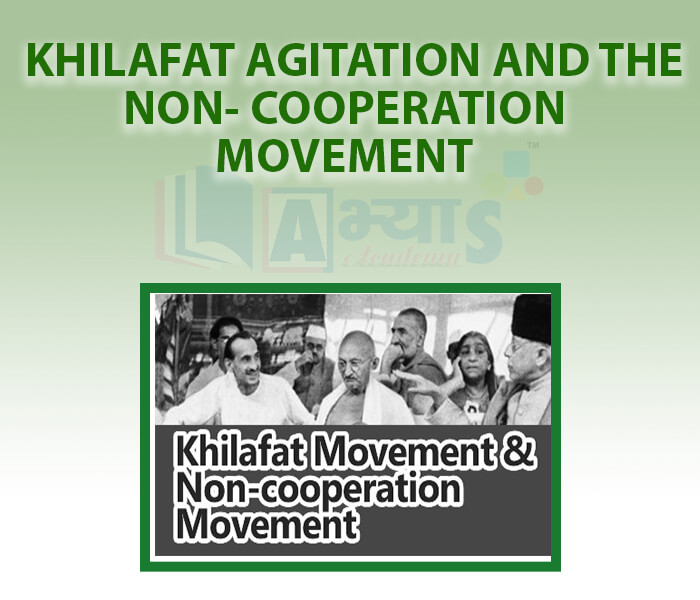Khilafat Agitation and the Non- Cooperation Movement













Khilafat Agitation and the Non- Cooperation Movement
Khilafat Agitation and the Non- Cooperation Movement:
History of Khilafat Movement : The Khilafat movement, also known as the Indian Muslim movement (1919–24), was a pan - Islamist political protest campaign launched by Muslims of British India led by Shaukat Ali, Maulana Mohammad Ali Jauhar, Hakim Ajmal Khan, and Abul Kalam Azad to restore the caliph of the Ottoman Caliphate (Turkey) who was considered the leader of Sunni Muslims, as an effective political authority.
It was a protest against the sanctions placed on the caliph and the Ottoman Empire after the First World War by the Treaty of Sèvres.The movement collapsed by late 1922 when Turkey gained a more favourable diplomatic position and moved towards secularism. By 1924 Turkey simply abolished the role of caliph.
Non Cooperation Movement : The Non-cooperation movement was launched on 4th September, 1920 by Mahatma Gandhi with the aim of self-governance and obtaining full independence (Purna Swaraj) as the Indian National Congress (INC) withdrew its support for British reforms following the Rowlatt Act of 21 March 1919, and the Jallianwala Bagh massacre of 13 April 1919.
Indian Muslims who had participated in the Khilafat movement to restore the status of the Khalifa gave their support to the non-cooperation movement. In response to the Jallianwala Bagh Massacre and other violence in Punjab, the movement sought to secure Swaraj, independence for India. Gandhi promised Swaraj in one year , if his Non-Cooperation programme was fully implemented. The other reason to start the non-cooperation movement was that Gandhi lost faith in constitutional methods and turned from cooperator of British rule to non-cooperator.
People’s Initiatives in India:
What was the period of the 'Non-Cooperation Movement' ? | |||
| Right Option : C | |||
| View Explanation | |||
Why was the khilafat Committee formed in Bombay in march 1919? | |||
| Right Option : B | |||
| View Explanation |
The congress supported Mahatma Gandhi's Plan for Non - Cooperation with the government (Sept. 1920) till the Punjab and Khilafat wrongs were removed and _________________ | |||
| Right Option : D | |||
| View Explanation | |||
Students / Parents Reviews [10]
It has a great methodology. Students here can get analysis to their test quickly.We can learn easily through PPTs and the testing methods are good. We know that where we have to practice

Barkha Arora
10thMy experience with Abhyas academy is very good. I did not think that my every subject coming here will be so strong. The main thing is that the online tests had made me learn here more things.

Hiya Gupta
8thI have spent a wonderful time in Abhyas academy. It has made my reasoning more apt, English more stronger and Maths an interesting subject for me. It has given me a habbit of self studying

Yatharthi Sharma
10thIt was good as the experience because as we had come here we had been improved in a such envirnment created here.Extra is taught which is beneficial for future.

Eshan Arora
8thBeing a parent, I saw my daughter improvement in her studies by seeing a good result in all day to day compititive exam TMO, NSO, IEO etc and as well as studies. I have got a fruitful result from my daughter.

Prisha Gupta
8thMy experience was very good with Abhyas academy. I am studying here from 6th class and I am satisfied by its results in my life. I improved a lot here ahead of school syllabus.

Ayan Ghosh
8thMy experience with Abhyas is very good. I have learnt many things here like vedic maths and reasoning also. Teachers here first take our doubts and then there are assignments to verify our weak points.

Shivam Rana
7thOne of the best institutes to develope a child interest in studies.Provides SST and English knowledge also unlike other institutes. Teachers are co operative and friendly online tests andPPT develope practical knowledge also.

Aman Kumar Shrivastava
10thA marvelous experience with Abhyas. I am glad to share that my ward has achieved more than enough at the Ambala ABHYAS centre. Years have passed on and more and more he has gained. May the centre flourish and develop day by day by the grace of God.

Archit Segal
7thAbhyas Methodology is very good. It is based on according to student and each child manages accordingly to its properly. Methodology has improved the abilities of students to shine them in future.
